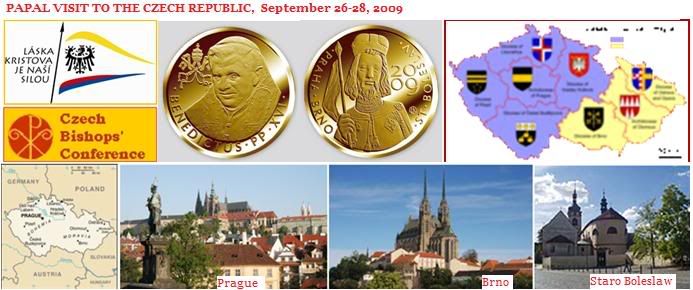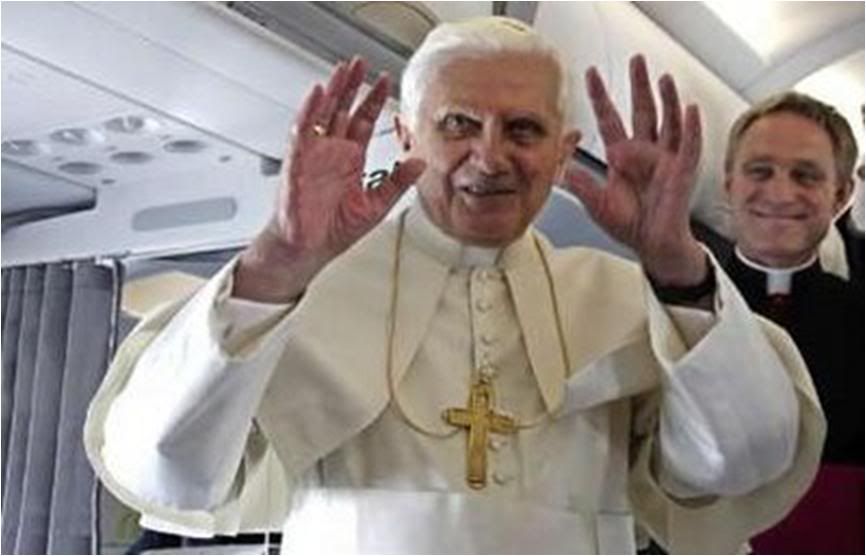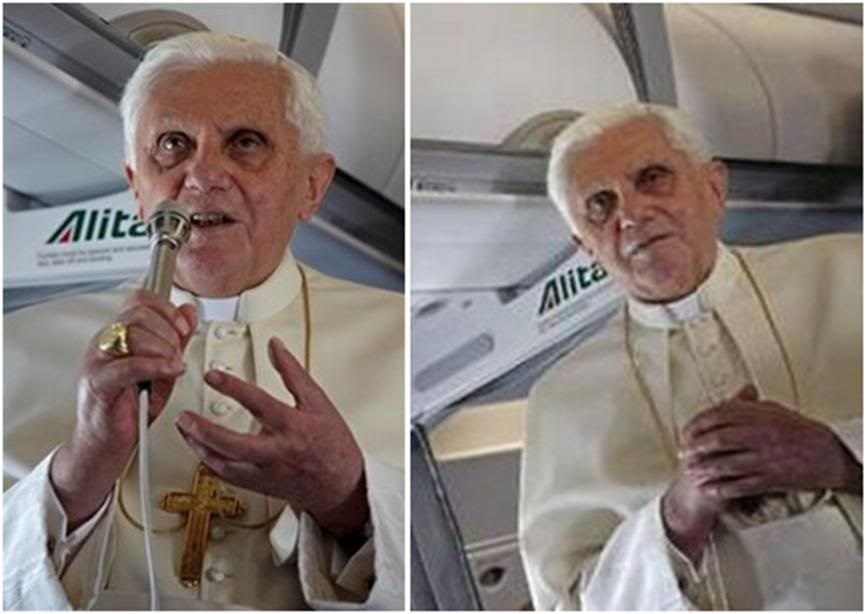 Before I get a chance to translate the in-flight interview given by the Holy Father enroute to Prague - Andrea Tornielli of Il Giornale and Gian Guido Vecchi of Corriere della Sera, have posted their transcripts of the audio recording - I will useL'Osservatore Romano's news report on it, as published in tomorrow's issue (9/27).
Day-1 THE INFLIGHT INTERVIEW
Before I get a chance to translate the in-flight interview given by the Holy Father enroute to Prague - Andrea Tornielli of Il Giornale and Gian Guido Vecchi of Corriere della Sera, have posted their transcripts of the audio recording - I will useL'Osservatore Romano's news report on it, as published in tomorrow's issue (9/27).
Day-1 THE INFLIGHT INTERVIEW
 An alternative to
An alternative to
a for-profit-only economy
At the start of his trip to the Czech Republic, Benedict XVI reiterates the need
to put back ethics and responsibility into the public debate
by MARIO PONZI
Translated from
the 9/27/09 issue of

In his now-customary encounter with newsmen on board the flight taking them to Prague on Saturday morning, Sept. 26, Benedict XVI more or less anticipated the themes of his discourses in the Czech Republic:
- The Christian roots of Europe
- The constructive role of the Church in building a common 'home' for all peoples
- The impact of
Caritas in veritate in urging ethics in economics, and
- The need for dialog with those who consider themselves non-believers.
He also referred to his minor accident last summer when he fractured his right wrist and said he was on schedule with the second volume of
Jesus of Nazareth.
Fr. Federico Lombardi, Vatican press director, presented the Pope with five questions chosen from suggestions coming from the newsmen themselves.
The Pontiff explained that this trip may be considered significant for the entire continent in the sense of building an authentic political and spiritual unity.
He said that the peoples of eastern Europe are undergoing a growth phase and are being called upon to take the place they merit as sovereign actors in the consensus of nations.
Nonetheless, he said, one should not under-estimate the price paid for forty years of repression [under Soviet-style Communism]. But the Pope also recalled the numerous priests, religious and lay faithful, men and women, who kept alive the flame of faith in those countries.
"These witnesses," he said, "taught us the great value of freedom, but have also taught us how to live it. When a nation suffers, then the concept of freedom matures as a counterpoint to the concept of dictatorship: the first is founded on the truth, and the second on lies."
This gives rise, he said, "to a lesson that is always relevant: freedom adn truth can never be separated, because freedom without truth will be destroyed."
Thus, he said, much more work is necessary to build true freedom, or better still, freedom that is closely linked to truth. He said the countries of Eastern Europe which experienced dictatorships 'based on lies' also showed the power of faith in helping people to resist and to recover lost values.
It is only right, therefore, to honor the peoples who have borne witness to that strength, and it is only right to call the attention of Europe to them, so that the continent may go back to searching its
Christian roots for a freedom based on truth - which, he pointed out, has nothing to do 'with libertinism'.
In this sense, said the Pope, the Church can do a great deal, even when it is a minority. "She can be a creative minority," he pointed out with so many values to transmit... which can be doneo even while carrying on a dialog with agnostics".
Those who call themselves non-believers, he added, "cannot be satisfied until they know everything about what they see, just as the Christian can never be satisfied only with what he knows".
As for the actual contribution that the Church can make, the Pope referred to two aspects: formation, as a response to the 'educational emergency' that the whole world is experiencing; and charity, as a contribution to mankind's common good.
On this subject, the Pope said he was very happy that his encyclical
Caritas in veritate has engaged worldwide discussion. He said that it was necessary to find an alternative to an economy that is only geared for profit-making. And that in this sense, it is necessary to bring back ethics to the center of economic affairs - this being the great challenge in this time of crisis.
"I hope," he said, "that I have made an impact on this debate, but above all, that the debate continues." If only because, he said, the conviction must be consolidated that responsibility to others must be considered more important than the desire for profit.
The Pope reassured the newsmen about his health after his wrist fracture in Les Combes last July. He said, his rehabilitative therapy is in progress.
"As you see," he said, jestingly holding his arm forward, "I can do the essential things at least: I can eat and I can write" [with the right hand].
He said that the privation he most minded when his hand was in a cast was not being able to write.
Asked about his work on the second volume of JESUS OF NAZARETH, he said he was on schedule, and that if it continues well, he will finish the book by next spring.


At the Prague airport, in his first address to the Czech people, the Pontiff paid tribute to Czech culture, 'profoundly permeated with Christianity', and called on them to rediscover the Christian tradition that had distinguished the country's history.
"The truth of the Gospel', he said, "is indispensable for a prosperous society, because it opens us to hope and makes us able to discover our inalienable dignity as children of God".
The Pope's morning ended at the church of Our Lady of Victory, where the Pope issued an appeal for acceptance and respect of every human being. The person, he said, "should be valued not for what he has but for what he is".
Benedict XVI also had s special thought for children who are victims of violence and exploitation. "Children," he reminded everyone, "are the future and the hope of mankind".
THE INTERVIEW IN FULL
Translated from the transcript
provided by ANDREA TORNIELLI
As in previous inflight interviews, five questions were chosen for the Pope to answer:
1. As you said at the Angelus, the Czech Republic is at the heart of Europe. How and why can this visit be important for the whole continent?
THE POPE: Throughout the centuries, the Czech lands have been a place for the encounter of cultures. Starting with the 9th century, in part of Moravia, we had the great mission of the brothers Cyril and Methodius who brought Byzantine culture from Byzantium itself, but also created Slavic culture by inventing the Cyrillic alphabet and a liturgy in Slavic languages.
In Bohemia meanwhile were the dioceses that proclaimed the Gospel in Latin, that is, a connection with Roman culture. Thus, the two cultures met each other. Every encounter is difficult but also fecund - and this can be shown by a few examples.
Let me jump to the 13th century and Charles IV who created here in Prague the first university in central Europe - in this case, a place of encounter between Slavic and Germanic cultures, especially in the centuries of the Reformation, when encounters and conflicts became decisive and strong.
Let me leap once again to come to the present. Last century, the Czech Republic suffer4ed through a particularly harsh dictatorship, but there was also a Catholic and lay resistance of the highest level - think of the texts of (Vaclac) Havel, of Cardinal Vlk and great personages like Cardinal Tomasek who clearly sent Europe a message of what freedom really is, and how we must live and build on freedom.
I think that from these centuries-long encounter of cultures - and particularly from this last phase which was not only of suffering, but also of reflection - there is a new concept of freedom. From a free society come so many important messages that can and should be fruitful for the construction of Europe. So we must pay careful attention to the message that comes from this nation.
2. [The second question is about the fall of the Berlin Wall and the historical phase it inaugurated].
As I said, these countries have particularly suffered under dictatorships, but were able to mature new concepts of freedom which are relevant today - and need to be further elaborated and put into practice.
It brings to mind a text of Vaclav Havel who said that dictatorship is based on lies, and that no one would lie in the light of truth, thus developing this link between truth and freedom. Freeom is not arbitrariness, nor libertinism, but it is linked to and conditioned by the great values of truth, love, solidarity, and of the general good.
Thus. I think that these concepts and ideas matured under the dictatorship should not be lost now. We should return to these concepts, recognizing that freedom today is rather empty and without values. We mustacknowledge once again that freedom is a value, freedom is an asset, that freedom and truth go together, otherwise freedom itself is destroyed.
That is the message that comes from these countries and which we should follow in our time.
3. [A question on the role of the Czech Church]
We see that normally, it is the creative minorities who deteremine the future. In this sense, I would say that the Catholic Church should see itself as a creative minority with a heritage of values which are not things of the past, but a reality that is very much alive and relevant, which should be actualized and made present in the public debate, in the fight for a true concept of freedom and peace, and thus contribute in various sectors, first of all in the intellectual dialog between believers and agnostics.
Both need each other. Agnostics should never be content not to know whether God exists or not, but should be in search of him and feel the great heritage that faith gives. The Catholic should not be content that he has the faith but should continue to find and know God. Especially in dialog with others, he must learn to know God more profoundly. This is the first level of cooperation - intellectual human dialog.
In the educational sector, the Church has much to do and much to give in the formation [of young people]. For example, let us consider Italy and its educational emergency, which is a problem common to the entire West. Education is something that the Church should always concretize and actualize, opening her great legacy to the future.
The third sector is charity. The Church has always had this as a sign of its identity - to be of help to the poor and needy, to be an organ of charity.
The Czech Republic does a lot in various situations of need and offers much to suffering people in other continents, thus giving an example that responsibility for others and international brotherfood are conditions for peace.
4 [A question on the encyclical Caritas in veritate, and whether mankind is more disposed to moral and spiritual reflection]
I am very happy for the discussion about it. This was the purpose, to incentivize and motivate a discussion of these problems - not to leave things as they are, but to find new models of a new responsible economy in individual nations as well as for all of a unified mankind.
I think it is now evident that ethics is not external to economics, that ethics is an internal principle of the economy, which cannot function unless it takes into account the human values of solidarity and reciprocal responsibility.
To integrate ethics in building the economy is the great challenge of the time. I hope I have contributed to this challenge with the encyclical. I find the current debate encouraging. We must continue to respond to the challenges of the world and help promote the idea that a sense of responsibility is greater than the desire for profit, that responsibility for others is stronger than selfishness. We wish to contribute to human economy even in the future.
5. [Question about his wrist fracture]
The problem is not yet fully overcome, but you can see that my right hand functions - at least, I can do essential things with it. I can eat and above all, I can write. My thoughts develop best when I am writing. It was a penalty as well as a school for patience not to be able to write for six weeks, but I could read and do other work.
I have made some progress with the book [JESUS OF NAZARETH, Part 2]. But there is still much to be done. With the bibliography and everything else, I think I can finish it next spring. But that is only my hope for now.
[Modificato da TERESA BENEDETTA 27/09/2009 12:44]